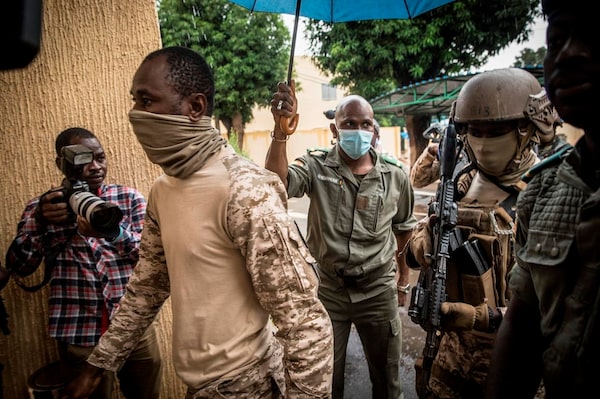
Col. Assimi Goita, center-left, who has declared himself the leader of the National Committee for the Salvation of the People, arrives to meet with a high-level delegation from the West African regional bloc known as ECOWAS, at the Ministry of Defense in Bamako, Mali on Aug. 22, 2020.The Associated Press
While donors and military allies grapple with how to respond to Mali’s military coup, the federal government says it is not considering a suspension of development aid to the strategically important West African country for now.
“It’s not something I’m considering at this point in time,” International Development Minister Karina Gould told The Globe and Mail in an interview.
Canada is one of Mali’s biggest supporters, providing $1.6-billion in development aid over the past 20 years, including $140-million last year.
Mali has been one of the leading recipients of Canadian aid in recent years. But the country has been hit with two military coups in the past eight years. Last week the military seized control by arresting Mali’s president and prime minister.
“We are following the situation very closely right now,” Ms. Gould said. “We condemn the coup and are quite concerned.”
Despite their criticism of the coup, many Western governments are reluctant to sever links with Mali because it is seen as a crucial partner in the battle against Islamist radicals in the Sahel region of West Africa. So far the United States is the only country outside Africa to have announced action against the military junta.
The U.S., which provides training to Mali’s army, said on Friday that it is suspending its co-operation with the Malian military as a result of the coup.
“Let me say categorically there is no further training or support of Malian armed forces, full-stop,” said Peter Pham, the U.S. envoy to the Sahel region of West Africa.
“We have halted everything until such time as we can clarify the situation,” he told journalists.
But while it suspended its military co-operation, Washington has not formally designated the coup as a coup – a step that could legally trigger a halt in direct U.S. support to the Malian government. The Pentagon has instead described the coup as “an act of mutiny.” A decision about whether to call it a coup is undergoing a legal review, Mr. Pham said.
France, Britain and Germany said on Friday they will keep their troops in Mali, despite their condemnations of the coup. A French-led military force of about 5,000 soldiers and a United Nations peacekeeping force of about 15,000 personnel have been fighting the insurgents and supporting Mali’s military in recent years.
German Defence Minister Annegret Kramp-Karrenbauer said the European military support is “still necessary” because the threat of terrorism from Mali’s insurgents “remains a great threat, including for us here.”
Independent analysts have suggested that Canada should rethink its aid strategy in Mali after the two coups over eight years. But in the interview on Friday, Ms. Gould told The Globe that the aid will continue. She said she would not want Mali’s humanitarian needs to suffer.
“Our assistance is delivered through trusted international partners, though international NGOs [non-governmental organizations] and the UN system,” Ms. Gould said.
Angela Savard, a spokesperson for Global Affairs Canada, said Canada is not providing any humanitarian assistance directly to governmental organizations in Mali.
Canada has deployed 21 police officers to Mali since the beginning of last year, including five who are serving in the UN peacekeeping mission in Mali. “Canadian officials are assessing the situation and no decisions have been taken about a change to police deployments to that country,” Ms. Savard told The Globe.
Canada also has 10 military officers serving in the UN peacekeeping force in Mali, and it has provided training to Malian forces in the past. Adam Austen, deputy director of communications for Foreign Affairs Minister François-Philippe Champagne, said Canada does not have any military co-operation with the Malian government.
A 15-member regional bloc of West African states, known as ECOWAS, has taken the strongest action against the military coup so far. It has sealed its borders to Mali, threatened to impose sanctions on the country, demanded the reinstatement of the ousted president Ibrahim Boubacar Keïta, and sent a team of mediators to negotiate with the military junta’s leaders.
Talks between the coup leaders and the West African mediators were continuing on Sunday for a second day in Mali’s capital, Bamako. The talks were “going very well,” according to Nigeria’s former president Goodluck Jonathan, who heads the ECOWAS delegation.
Mr. Jonathan said he met Mr. Keïta at the military camp where he is being held, and the ousted leader is “very fine.”
The military junta has promised to set up a transitional council and hold elections. Protesters in the streets of Bamako, who have been opposing Mr. Keïta for months, have celebrated the coup.
Our Morning Update and Evening Update newsletters are written by Globe editors, giving you a concise summary of the day’s most important headlines. Sign up today.
 Geoffrey York
Geoffrey York Mark MacKinnon
Mark MacKinnon Steven Chase
Steven Chase